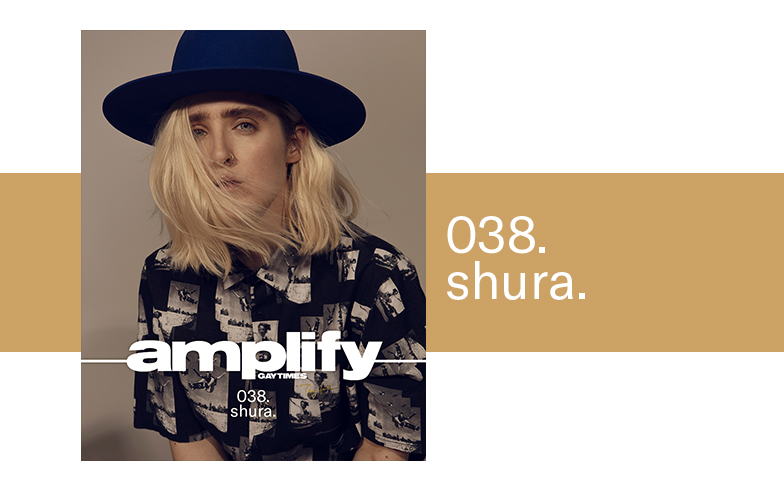
“There are still people who think the world would be better if we didn’t exist. There are people who actively want to kill us.”
While Shura’s debut album was a collection of infectious synthpop anthems that reflected the singer’s crippling anxiety and lack of success in love, her sophomore effort – while still retaining her signature dream-pop sound – is the star at her most confident. Nothing’s Real was her interpretation of a John Waters-esque comedy-drama and Forevher is her version of iconic lesbian romance Blue is the Warmest Colour, basically.
“When you do struggle with anxiety and write a record, you almost write a script for yourself,” she tells us. “You’re in this play, this film, this awkward kid no one speaks to in the corner. That doesn’t have to be true. The fact that I don’t like flying or that I overthink things doesn’t have to define my entire existence.”
The maturity on Forevher can felt; themes range from sex, identity and religion, the latter of which is an important aspect of Shura’s art, which is quite peculiar because she identifies as an atheist. “It really struck me as a non-believer, that there must be something about religion that humans need,” she explains.
“I was kind of contemplating going to study it at university and then I realised everyone there was training to be a priest. I thought, ‘I’m a lesbian and an atheist, what the fuck am I going to do there?’”
We caught up with Shura to discuss her widely-acclaimed new album, sexism within the industry, and the Illuminati taking time out of controlling world affairs to fund her music videos (read the interview, it’ll make sense later).
It’s been three years since you released your debut album Nothing’s Real – how have you evolved since then?
The biggest shift, which is reflected in the way that I write, is realising that my struggles with anxiety don’t define me. When you do struggle with anxiety and write a record, a debut record like the one I wrote that was primarily about me being insecure, unhappy and unsuccessful in relationships, you almost write a script for yourself. You’re in this play, this film, this awkward kid no one speaks to in the corner. That doesn’t have to be true. The fact that I don’t like flying or that I overthink things doesn’t have to define my entire existence. Going through years of therapy and falling in love, when you find someone who likes you back, it makes you feel good about yourself. I think Forevher is a more mature record. I see my first as a high school, John Waters movie kind of collection of songs whereas this is more of a Blue is the Warmest Colour vibe – without a seven minute long sex scene! Although there is that.
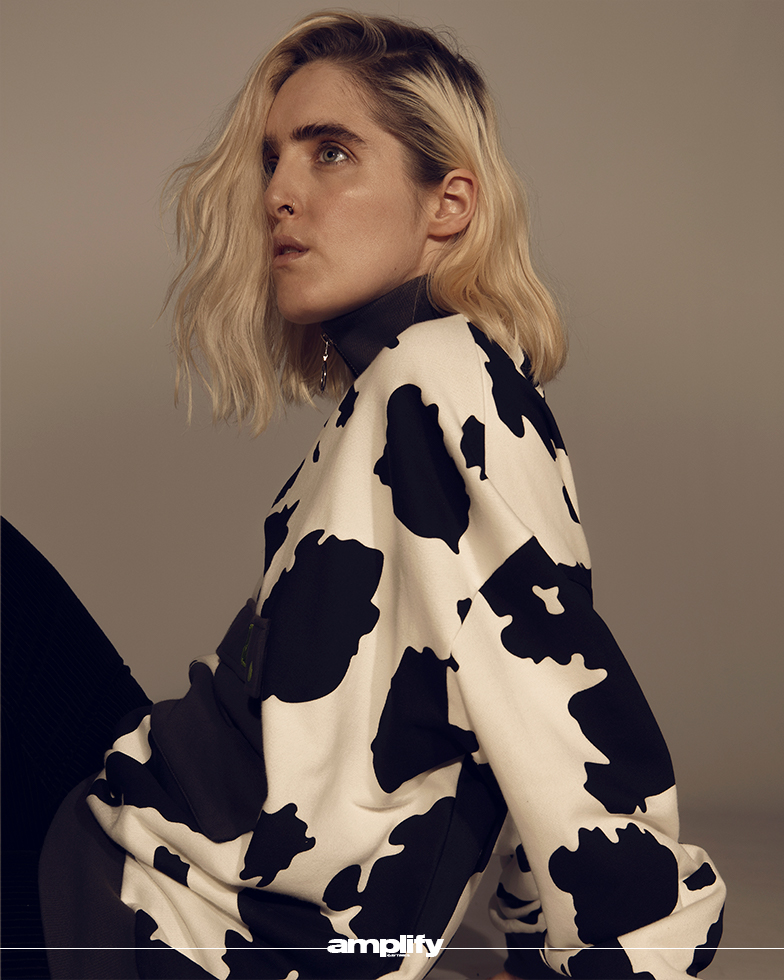
There’s still a massive stigma attached to women who enjoy having sex. Why do you think that is?
Women who are perceived as to enjoy sex has historically been a big problem in culture. It’s not for nothing that Mary gave birth to Jesus, but is a virgin, and that with Eve, it means that we were all born with sin. I think misogyny is still a huge problem in the United States. I do wonder whether they are ready to elect a female president, and I don’t know if they are yet. The idea of women taking pleasure in sex is something that has urked culture. It’s even more of a problem when it’s two women having sex together, no men involved at all. I do think it’s something we still struggle with. Obviously, sex is part of my record, but it’s still done in a way that’s maybe less explicit, but that’s more to do with my own comfort levels! I’m highly conscious that my parents are listening to my records.
Religion is a recurring theme throughout your work, especially on Forevher. Where does this fascination stem from?
My dad was an atheist and my mum was religious, although I’m not sure she still is now. If she is, it’s out of habit rather than actually practising. My dad is a documentary filmmaker and he made a few documentaries about religion and different stories within the umbrella of religion, so it was just part of the household conversation. He would read us bible stories, which was quite a weird thing for an atheist parent to do, but he felt that it was important for us to know those stories. For so many people, they are important. Secondly, in most religious texts there are good lessons. It really struck me as a non-believer, that there must be something about religion that humans need. I also had a great RE teacher at school. I was kind of contemplating going to study it at university and then I realised everyone there was training to be a priest. I thought, ‘I’m a lesbian and an atheist, what the fuck am I going to do there?’
So you wanted to be a footballer, but nearly ended up becoming a lesbian atheist priest. Brilliant.
I was scared that I might suddenly become religious as well, if I go too far down the rabbit hole and then maybe my dad would disown me as well. I think he would be much more upset if I came out as a believer than a lesbian, which is funny.
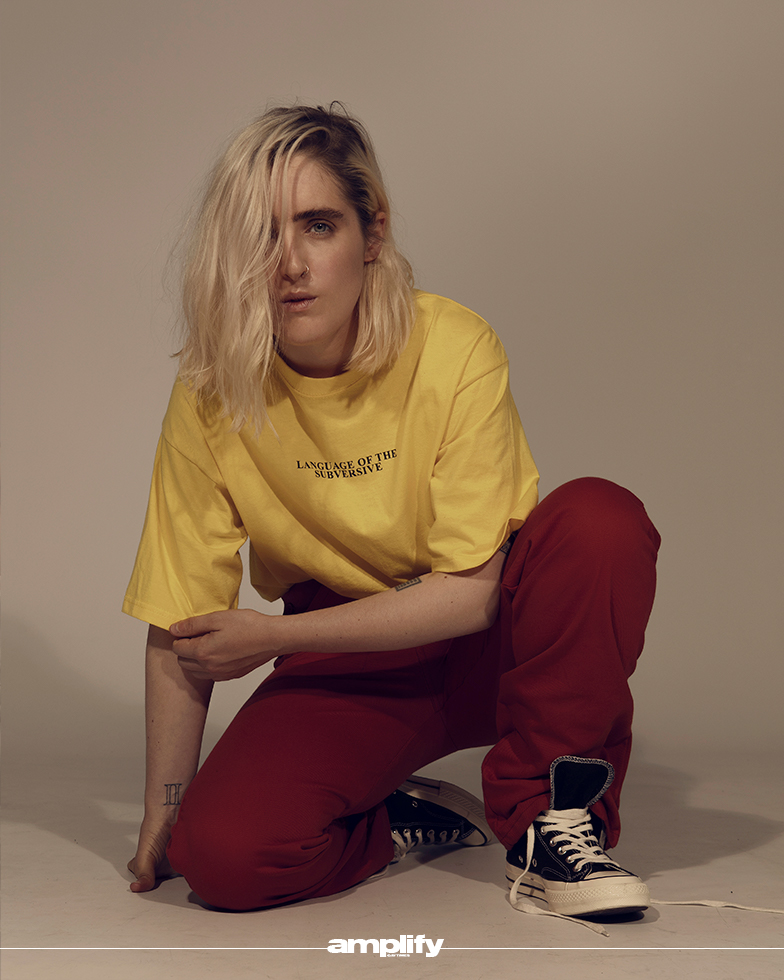
You dressed up as the Pope in your video for Religion. What kind of response did you get from that?
There were a few comments on YouTube, but I mean fair enough, I was dressed as the fucking Pope. The Pope is not supposed to be a woman and there was a convent of lesbians running around. I was surprised how little there was actually, but we had conspiracy theorists who found it and decided I was a member of the Illuminati and that they funded the video. We were laughing, we were like, ‘Wow, we have tricked them into thinking this had cost hundreds of thousands of pounds’.
You just performed at HearHer festival. Why is it so important to have spaces for just women and non-binary people to perform?
It would be incredible if we didn’t have festivals that were just women and non-binary, or just people of colour or queer people, but we’re still at a stage where it’s important to have spaces to showcase these kinds of artists, people who fall under minorities. When you look at festivals, and I won’t name names, if you removed every man on the line-up, you’d have around three people playing. What’s shocking is that has always been the case, and I hadn’t thought about it before. Social media has changed the way we observe the world slightly, in that we’re all able to voice an opinion in a way that we have never been able to before. Everyone has a megaphone now. We’re getting to see that so many people and great musicians are really underrepresented at these kind of festivals, and there’s always excuses that are rolled out, for instance that women don’t sell as many tickets. Primavera is always sold out, like, it’s just not true. It’s just what we’re told. It explicitly tells people and a young generation of musicians, ‘Don’t bother if you’re a woman, if you’re gay, if you’re a person of colour, if you’re trans or non-binary, because you’re not going to get booked unless you’re five straight white men in an indie band.’ It would be amazing if we didn’t need these spaces, but it’s a similar conversation around Pride isn’t it? It would be great if we didn’t need Pride but we do, because there are still people who think the world would be better if we didn’t exist. There are people who actively want to kill us. I forget that in London, until weird shit like the bus attack happens and you have to look over your shoulder. I want to hold my girlfriend’s hand, it’s not like I even want to snog, I just want to hold her hand.
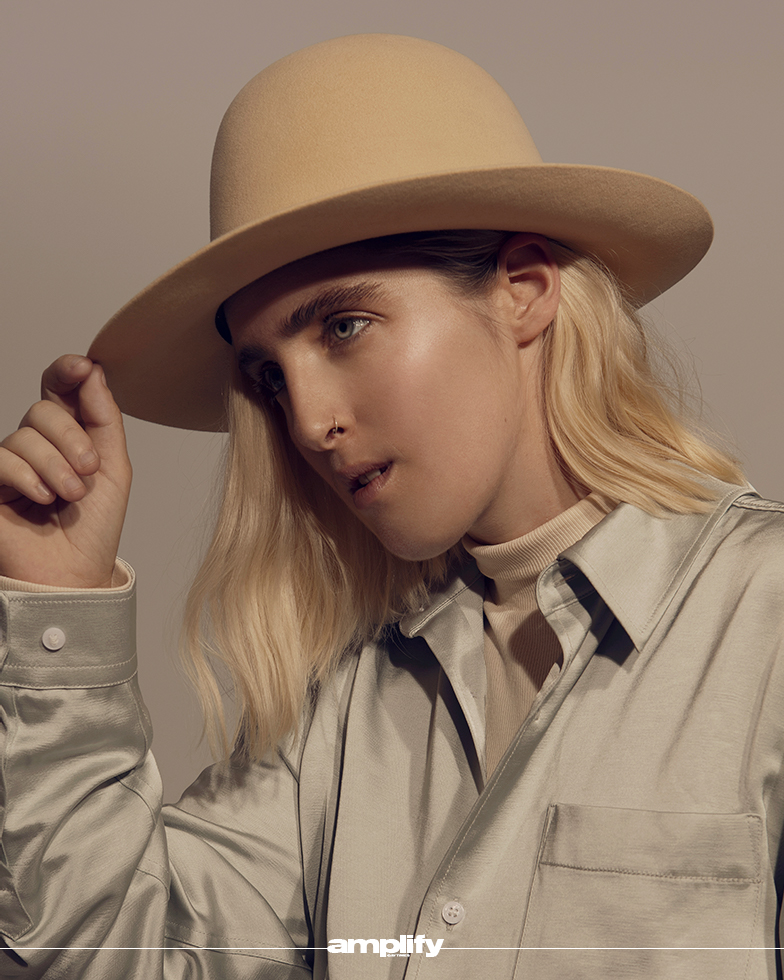
It’s incredible seeing same-sex couples walking down the street, because even ten years ago I wouldn’t have dared to do that out of fear.
I remember six or seven years ago there were two gay men who were walking down my street and I said to them, ‘This is so awesome to see.’ But I’ve had my awkward moments on holidays. I was staying with my girlfriend in a room in Mexico and it was clear we weren’t sisters. I was like, ‘Oh god, are they going to be weird?’ It’s not like they weren’t going to let me stay, but I was a bit like, ‘Are they going to be weird at check-in? Are they going to make me feel strange?’ It was totally fine, but you’re still thinking about that. Well, I am. I hope that the next generation doesn’t have to, anyway.
That little voice in your head, the one that tells you that you’re going to be a victim of a hate crime, is exactly why we need Pride. So it baffles me when members within our own community say it’s not needed. Have they never had those thoughts before?
Certainly, I remember as a teenager going through a phase of complacency about Pride and LGBTQ societies at university. I remember being, ‘Oh, I’m not going to join that, I don’t need that. I came out, I was fine, I got teased a couple times, but I’m fine.’ But it’s not just about me and my experience. I grew up in Manchester and we had the gay village, so it was probably relatively easy compared to a lot of people. I think the more you come to learn about all the different queer experiences, you learn that we’re all under this umbrella together.
Was it important for you to enter the industry out-and-proud?
I wouldn’t think of it as important, I didn’t think of it in that way. Looking back on it now, it was sort of an unconscious act in that sense that I would not be able to not be out, because I was out in my life. To be an autobiographical songwriter and not to specify that would feel strange. I didn’t ever really feel like I should keep it quiet for a bit and have a massive hit, and then at the end of the career be like, ‘Oh by the way, I was dating women the entire time.’ But then, I really respect that Lil Nas X had this mental huge success and at the very height of his fame said, ‘I’m gay.’ That is so wonderful. It’s not that I have judged people for not talking about it and waiting until they maybe have a bigger platform, because I think that’s a really effective way of changing people’s perceptions too. I look back on Touch, the song and that music video and think, ‘I guess that was cool,’ because beyond Tegan and Sara and a handful of other out queer female musicians, there weren’t many of us. Now there’s loads, and to be part of that kind of story, or that beginning… I’ve been in interviews before where the journalist has said fans credit that song for making them feel comfortable enough to be out and put out music. That’s new to me. I have never really thought that’s the kind of effect I could have had on another person.
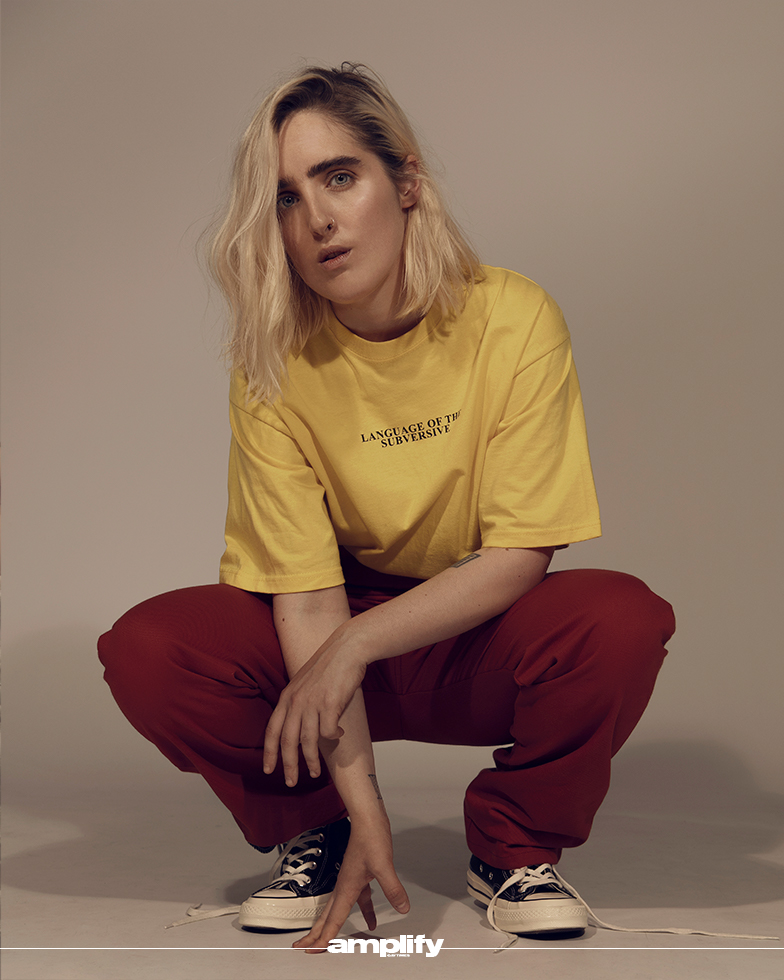
How does it feel then, when people say you’re the reason they’ve come out?
I mean, if it’s true! There’s still a self-deprecating part of me that doesn’t really believe it. If it’s true, then it does make me feel emotional. It sort of makes me cry. I’m not crying right now! It would make me feel proud of myself. I’m not claiming this is true! But yeah, I am proud of being out from the beginning, even though it wasn’t a tactical decision. Sometimes you don’t know you’re being brave until afterwards.
How important is it, especially right now in our current political climate, for the LGBTQ community to rally together and support each other?
I feel like, for the first time in a really long time, it’s actually cool to lift up other people. I’m so over beef and I think people are over beef. I was 15 when I was obsessed with Tegan and Sara and went to visit them in a tiny London venue. Ten years later and they discovered my music and asked me to join me on tour. They have been so supportive of me and they’re always sharing my music when I put something out, They’re kind of like big sisters. They really look and support fellow queer people and I have seen that kindness, and it has benefitted me to do the same.
Shura will be playing London, Glasgow, Manchester and Dublin this November. You can purchase tickets here.
Photography Jakub Koziel
Fashion Umar Sarwar
Hair and Makeup Joel Phillips using MAC Cosmetics
Fashion Assistant Miranda Mikkola



